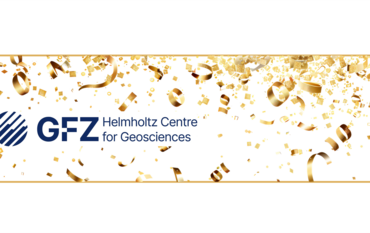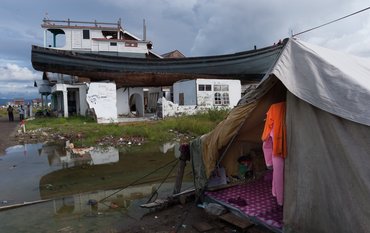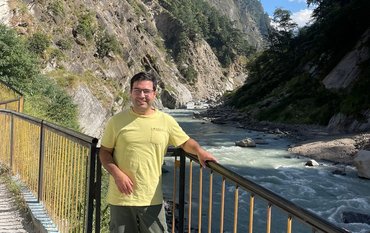On 12 July 2023 the General Assembly of the International Union of Geodesy and Geophysics (IUGG) will open its doors in the City Cube of Messe Berlin - after five years of preparation. More than 4,700 participants from over 100 countries have registered for one of the world's largest geoscientific conferences, which takes place every four years - more than ever before. The GFZ German Research Centre for Geosciences is the scientific host.
The thematic spectrum covers almost all areas of the geosciences - from geodesy, i.e. the ultra-precise measurement of the Earth, e.g. via satellites, to hydrology, glaciology and oceanography, atmospheric sciences and climate research, to seismology and volcanology.
Journalists are cordially invited to attend the conference.
All lectures will be held in English.
Date: 12-19 July 2023
Location: City Cube of Messe Berlin
Website:https://www.iugg2023berlin.org
Some scientific highlights
Union Symposia
Lecture - in the framework of the Union Symposium "Geoscience and Mathematics for Sustainable Development:
- Contributions of geosciences to sustainable development (goals)
Magdalena Scheck-Wenderoth (Director Dep. 4 Geosystems at GFZ and Professor at RWTH Aachen)
The other Union symposia are:
- Artificial Intelligence for Managing Natural Hazards and Disasters
- New Discoveries in Deep Interior of the Earth and Planets
- New Advances in Planetary Science and Comparative Planetology
Union Lectures
The Union Lectures are hosted by leading scientists from around the world. They are aimed at the broad geoscientific community.
Their topics range from questions about the concept of "time" in measuring the Earth and new methods for gaining insight into the Earth's interior, to new models for mapping groundwater and the role of science in preserving the ocean habitat, to the contradictory role of particulate matter in health and climate protection in developing countries.
We would particularly like to draw your attention to these two lectures:
- When Giants Falter: Tipping Points in Greenland and Antarctica
Ricarda Winkelmann (Professor for Climate System Analysis at the University of Potsdam and the Potsdam Institute for Climate Impact Research (PIK))
- SEIS on Mars: First legacy after 4 years of seismic monitoring of Mars
Philippe Lognonné (Professor of Geophysics at the Université Paris Cité and Planetary Seismologist at the Institut de physique du globe de Paris)
An overview of all Union Lectures can be found here: https://www.iugg2023berlin.org/union-lecturers/
Big Themes
Special sessions will address overarching themes such as Open Science, Open Data, Open Software; Needs and Demands of Young Scientists; Diversity, Equality, Inclusion or Education and Capacity Development (North-South Dialogue).
You can find an overview here: https://www.iugg2023berlin.org/big-themes/
Award ceremonies with lectures
Gold Medal Lecture
The Gold Medal is IUGG's highest award, presented every four years to recognise earth and space scientists for outstanding contributions to geodesy and geophysics.
This year, the Gold Medal is awarded to French paleoclimatologistValerie Masson-Delmotte"for her leadership in projects to record climate in deep ice cores, to decipher isotope deposition on polar snow, and for her outstanding contributions to raising society's awareness of climate change."
- Her award lecture is titled:
Early Career Awards & Lectures
During IUGG 2023, 10 early career scientists will be honoured for their outstanding research.
An overview of the award winners can be found here.
An overview of their lectures can be found on page 7 of the programme pdf.
Host GFZ invites you to visit
The GFZ German Research Centre for Geosciences is the scientific host of the "IUGG 2023". The Local Organising Committee is headed by Harald Schuh, Director of the GFZ Department of Geodesy. He said:
"We are delighted that this major gathering of geoscientists from all over the world is taking place in Berlin, and thus in Germany again after many years. In the Berlin-Brandenburg region, one of the largest scientific communities in the world is conducting research on questions relating to the Earth system. In addition to the many scientific highlights, IUGG 2023 will offer a special platform for personal encounters, the exchange of ideas and the development of new concepts for international scientific cooperation, which suffered a setback in the Corona pandemic. And it will help create a new spirit to address pressing major societal challenges such as global environmental change and natural hazards, and to stimulate new geoscience research."
Public days in the exhibition hall: 14-16 July, 10:30am-4:30pm.
As part of the Science Year 2023 "Our Universe", the conference opens its exhibition area to all interested parties
On the public days, all interested parties are invited to visit the exhibition hall to find out about current research topics and innovations in the geosciences and to talk to researchers at information stands.
They are also aimed in particular at young people, who can find out about study prospects, for example.
On these days, admission to the exhibition hall is free of charge.
Special highlights of the exhibition:
- GFZ with RIFS: Changing presentation of current research topics (see details below)
- NASA: A large exhibition area
- Airbus
- Federal Institute for Geosciences and Natural Resources (BGR)
- TerraQ research project: development and application of new quantum technologies and measurement methods for gravimetric surveying of the Earth - on the ground and from space.
- Companies such as Digos, Nanometrics or Kinemetrics, which develop and offer technology for satellite as well as earthquake and tsunami detection.
- The mobile dome of the Berlin planetariums
Programme at the GFZ exhibition stand + RIFS
Thu, 13.07. (Media + Science)
10-14 hrs:
Geomagnetism;
Geo.X: The geoscientific competence network of the Berlin-Potsdam region
14-18 hrs:
Geo.X: The geoscientific competence network of the Berlin-Potsdam region
Fri, 14.07. (Public days)
10-14 hrs:
Geo-Energy, geothermal energy; 3D subsurface models; RIFS: Geoengineering.
14-18 hrs:
Drilling into the Depths: 25 Years International Drilling Programme ICDP
Sat, 15.07. (Public days)
10-14 hrs:
Floods: From causes to impacts – risk assessment and management
14-18 hrs:
The GRACE-FO satellite mission: Our global water monitor in space
Sun, 16.07. (Public days)
10-14 hrs:
The GFZ student laboratory introduces itself
14-18 hrs:
30 years GEOFON: Earthquake monitoring worldwide
Mon, 17.07. (Media + Science)
10-14 hrs:
The GFZ student laboratory introduces itself
14-18 hrs:
RIFS: Deep seabed mining?
An overview of the exhibition area and the exhibitors can be found from p. 36 in the programme pdf.
---------------------------------------------------
More information about the programme and the latest news:
https://www.iugg2023berlin.org
Journalists are cordially invited to visit the conference.
We are happy to help arrange interviews.
Please apply for accreditation before your visit at:
Admission only with a valid press card.
Please report to the Registration Office on site.
Background:
IUGG is an international scientific organisation primarily concerned with the disciplines of geodesy and geophysics. It was founded in 1919 and currently has 58 full and 15 associate member states. It comprises eight semi-autonomous associations, each responsible for a specific subject area.
Every four years, the IUGG holds its general assembly, to which the entire geoscientific community is invited to participate in scientific exchange through lectures, panel discussions, workshops and poster presentations.
During the general assembly, IUGG leadership positions are elected and important decisions are made, such as the adoption of internationally recognised resolutions and the venue of the next assembly.



![[Translate to English:] Fire in a forest, smoke rising, aerial view from above](/fileadmin/_processed_/8/3/csm_2025_01_06_AdobeStock_415831729_5a0e6d50d3.jpeg)









![[Translate to English:] [Translate to English:] Abror Gafurov von dem Schriftzug "Welcome to Azerbaijan" und den UN und COP Logos](/fileadmin/_processed_/2/5/csm_2024_11_Baku_COP29_Abror_Gafurov_1042faec82.jpeg)


![[Translate to English:] Martin Herold standing in front of the library on the Telegrafenberg](/fileadmin/_processed_/c/d/csm_Martin_Herold_d385ee4dd9.jpeg)
![[Translate to English:] Many people are listening to a presentation in the GFZ lecture hall.](/fileadmin/_processed_/c/a/csm_1_Bild1_hell_b9c0e9f5ed.jpeg)






![[Translate to English:] Both scientists sitting on stools in front of a wall of books in the Telegrafenberg library](/fileadmin/_processed_/6/6/csm_Buiter_Castell_DORA_4_e87cb1ea18.jpeg)
![[Translate to English:] Gruppenbild mit 4 Personen](/fileadmin/_processed_/8/d/csm_20241017_GFZ-Emmerman-Medal-005_web_reinhardtundsommer_21a414fa4a.jpeg)






![[Translate to English:] Ice landscape with five red tents](/fileadmin/_processed_/8/9/csm_Zeltlager_auf_dem_Eis_Urheberin_Jenine_McCutcheon_5ced2d523b.jpeg)